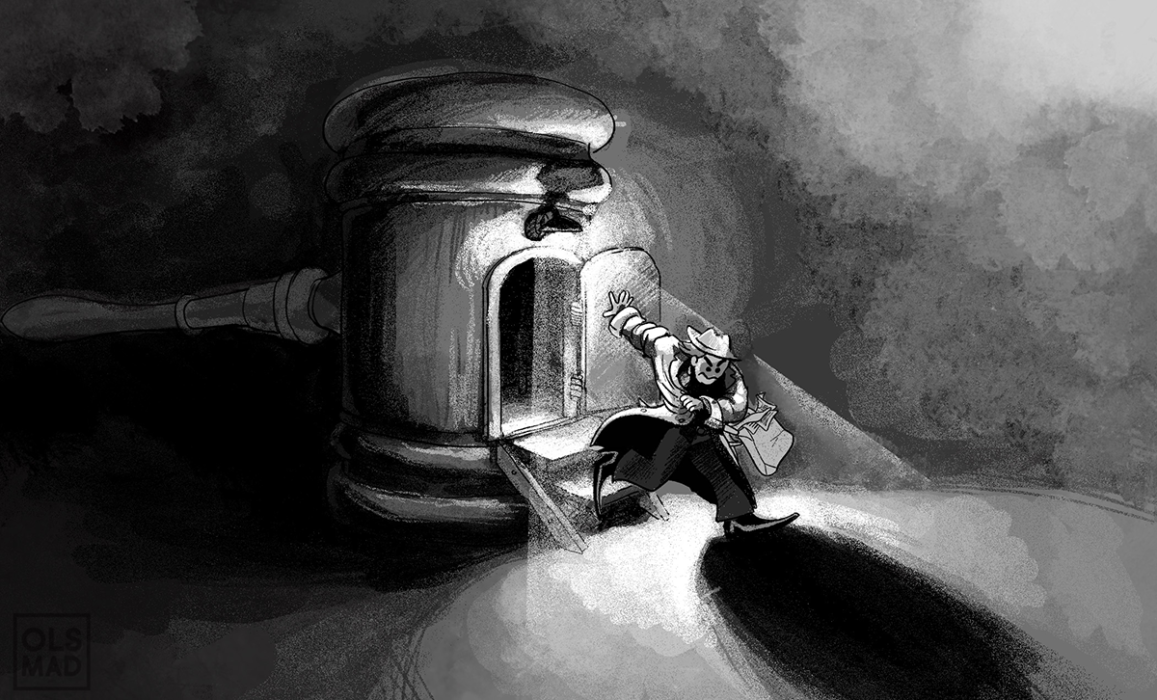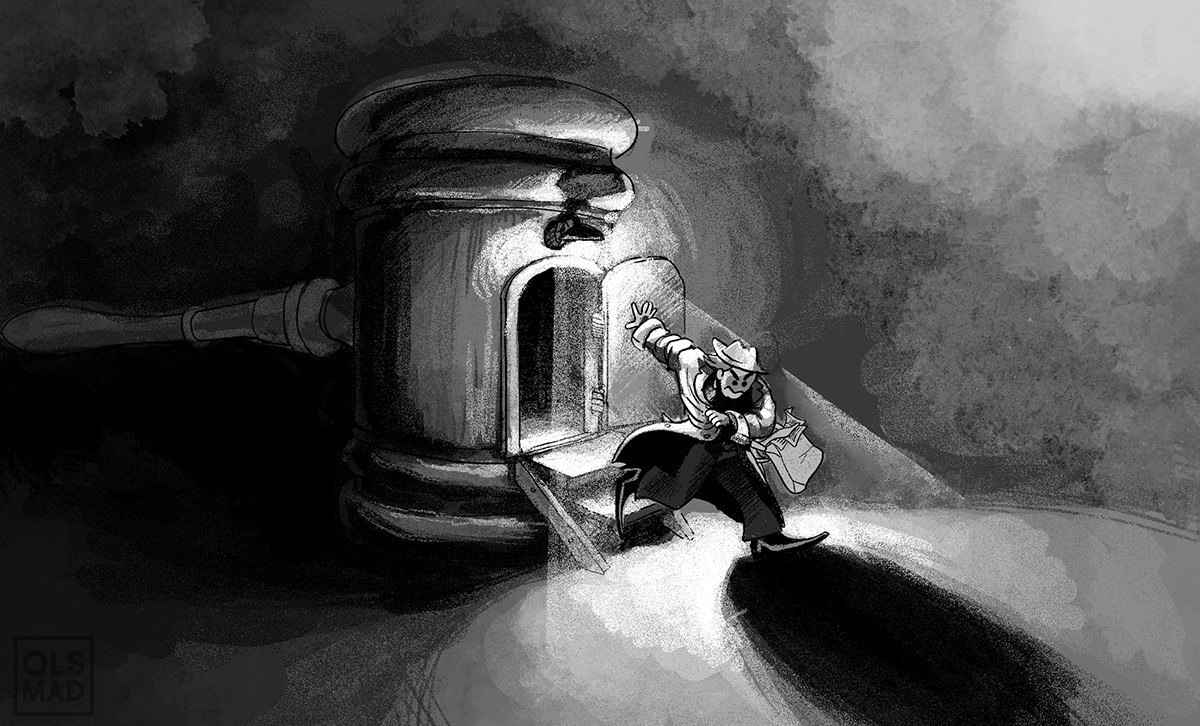
Like a lot of public defenders working in Oregon, Brook Reinhard is feeling spread thin. As executive director of Public Defender Services of Lane County, his job is to provide indigent defense — ensuring people receive their constitutional right to an attorney, even if they can’t afford one. But with inadequate funding and huge caseloads, his job is becoming increasingly difficult.
Lane County Public Defenders employs about 20 attorneys, but in the last year, six have retired or left for private practice, Reinhard said.
“The biggest single reason they leave is high caseloads,” Reinhard said. “The second issue is flexibility and pay. Those two things go hand-in-hand.”
Overworked and fed up, some Oregon public defenders staged a walkout on June 10, while others reduced the cases they accepted for weeks in a bid to urge reform. The American Civil Liberties Union has also threatened to sue the state over the system’s inadequacy.
It’s a story echoed across the region and the country as public defenders struggle with high caseloads and meager funding. Last month, officials with the Wyoming Office of the State Public Defender pleaded with state lawmakers to fund more staff. Since 2007, the office’s workload has grown by some 2,000 cases per year.
In Utah’s rapidly-growing St. George area, a single public defender, Edward Flint, has around 300 active cases; the county pays him a $58,000 salary with no benefits. Flint felt the system was so dire he invited a reporter from The Salt Lake Tribune to witness his workday for themselves. In Arizona, state lawmakers continually siphon away funds meant for public defenders and give them to law enforcement or border patrol.
All this makes recruiting top lawyers difficult, Reinhard said, since private practices generally have half the cases and offer twice the salary. Meanwhile, cases that need public defenders keep piling up. In 2017, 10 of Reinhard’s attorneys had caseloads that exceeded national standards, according to a report released this year by the Sixth Amendment Center, a nonprofit group that helps state and local policymakers study and improve their criminal justice systems.
The Sixth Amendment report also found Oregon lacked enough state oversight. It raised alarm about the state’s system of paying fixed fees for cases, which “pits appointed lawyers’ financial self-interest against the due process rights of their clients.”
“You can make a high caseload work, but it’s going to be at the expense of something,” said Reinhard. Either an attorney works 80 hours a week to address the backlog, or a client must wait for their case to be resolved — sometimes from a jail cell. Some clients decide to take a plea deal, even if they’re not guilty, just so they can move on with their lives.
“If you’re not an ethical attorney, maybe you pressure those clients to take those deals,” Reinhard said.
In addition to denying impoverished people their rights to an attorney and a speedy trial, an overtaxed public defender system potentially leaves corruption in the court system left unchecked.
“I think the role of the public defender is not just to represent one client at a time, but also to serve as a watchdog for civil rights of people and the civil liberties of this country,” said Robert O’Brien, an assistant federal public defender in Las Vegas. “It’s easier to address systemic problems with lower caseloads. That’s why a lot of public defenders focus on caseload as the issue.”
In the late 1990s, The Bureau of Justice Statistics once calculated that, in the 75 largest counties, 82 percent of felony defendants tried in state court and 66 percent tried in federal court relied on a public defender. David Carroll, executive director of the Sixth Amendment Center, estimates the ratio of people relying on public defense in felony cases is even higher today.
Carroll has studied the public defense systems in numerous states, including Utah, Idaho, and Nevada. Although certain states, like Oregon, have a lot of work to do, Carroll said the West is generally ahead of the curve when it comes to indigent defense reform.
“There are problems, but the fact that so many Western states have looked at this issue and are rapidly changing is good,” he said.
Utah, for example, created its Indigent Defense Commission in 2016 to provide oversight and state funds to city and county public defense offices. In June, the Nevada Legislature created a state Department of Indigent Defense Services, and a separate board to oversee it.
Still, there’s plenty of room for improvement. Some states, like California, have significant disparities in the quality of defense between urban and rural counties, Carroll said. Arizona lacks a state agency responsible for identifying problems with indigent defense.
And even after this spring’s walkout in Oregon, a bill meant to reform the state’s public defense issues failed in the Senate. The proposal had been amended so heavily in the House that it essentially morphed into a toothless task-force study, according to Lane Borg with the Oregon Office of Public Defense Services.
“Once it was gutted to a task force, I was delighted it didn’t pass,” Borg said. “I said at the beginning of the session that if [the bill] turns into another task force, I would see that as a complete failure.”
However, state lawmakers did earmark an extra $20 million for Borg’s office to begin addressing problems identified in the Sixth Amendment Center report. Among Borg’s priorities is overhauling the way the state pays public defenders. Right now, he said, “the only way you can get more money is to take more cases.”
Reinhard said an hourly rate instead of per-case pay would go a long way in enabling public defenders in Lane County to make a better living and help their clients more effectively. Most attorneys go into public defense out of a sense of altruism, Reinhard said, but his employees still need to make ends meet.
“I love my clients, I love fighting the good fight. We get to see people at their worst, and help show [juries] that the worst thing a person does does not define them,” Reinhard said. “I could see myself retiring as public defender, but not if they don’t reform the system.”

